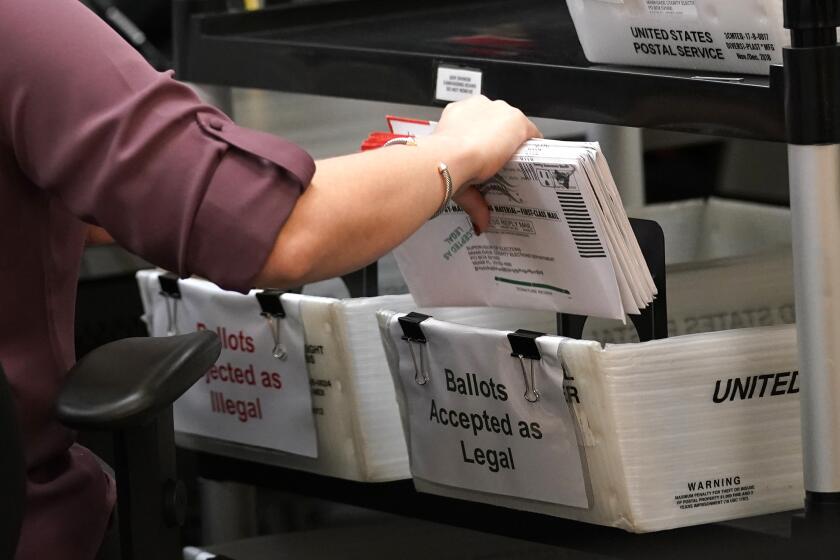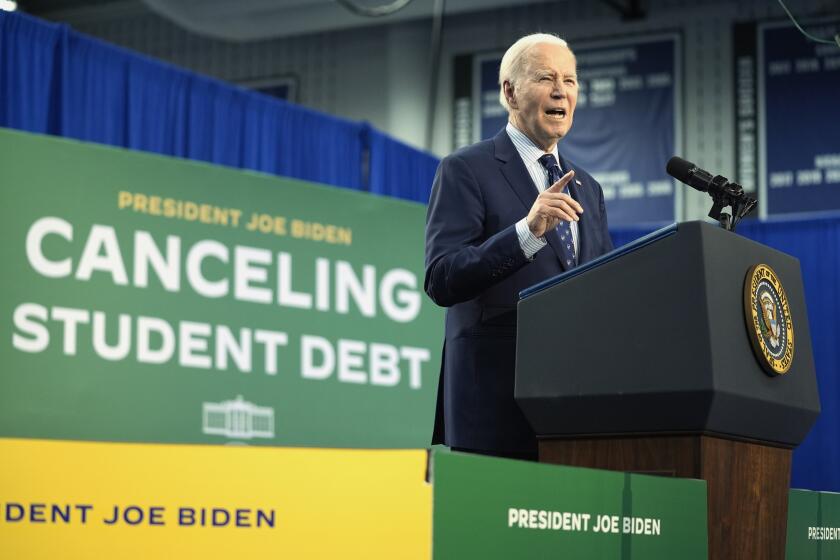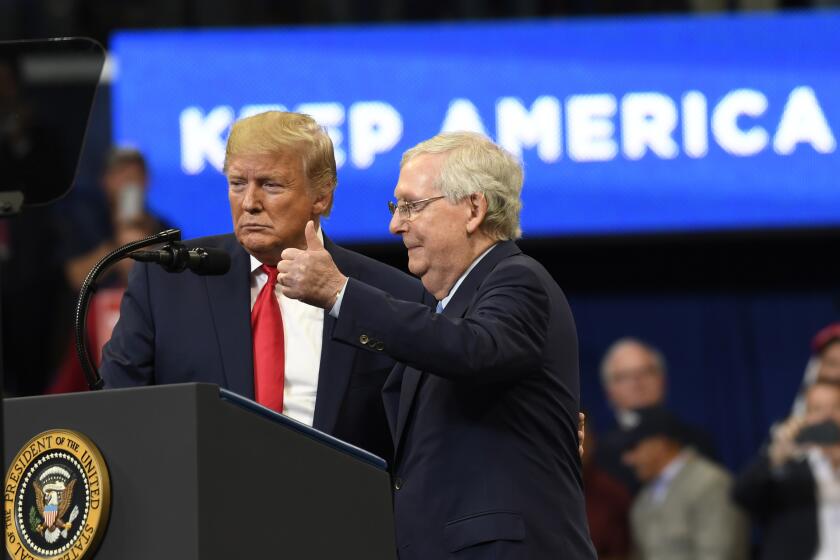Column: Why San Diego hoteliers hate Measure D

Ronald Reagan said the nine most terrifying words in the English language were these: “I’m from the government, and I’m here to help.”
The executives who run San Diego’s mighty hotel industry seem to have forgotten the Gipper’s favorite libertarian quip. At least, that’s one way to explain their mixed feelings about Measure D on Tuesday’s ballot.
Along with requiring the Chargers to pay for their own stadium, the initiative would set hard, voter-imposed limits on public subsidies for the tourism industry. In theory, no future city council could bestow new goodies on politically favored hoteliers without another public vote.
Yet, at the same time, Measure D would hand hoteliers a legal mechanism to lock up annual subsidies -- worth nearly $80 million and growing -- for promoting the city as a destination and funding “tourism infrastructure,” such as building and fixing up convention centers.
For the industry, that’s a whole lot better than the Chargers’ Measure C, which would use hotel taxes to help build a stadium and convention center, leaving just $20 million a year guaranteed for tourism marketing.
The yin and yang in Measure D is by design. When the industry’s nemesis, attorney Cory Briggs, was drafting what became Measure D, he consulted closely with lawyers and lobbyists working for John Moores, the local hotelier and former Padres owner.
Former Councilwoman Donna Frye backs the measure because it would encourage the city to build a park at the Qualcomm Stadium site and transfer the rest of the property to San Diego State University, a legacy-boosting priority shared by Moores.
Also in the smoke-free room, in person and metaphorically, were representatives from the San Diego Lodging Industry Association, a trade group, along with advisers to Mayor Kevin Faulconer. The idea was to bake a grand compromise, which quickly melted down.
Let’s pause here to rehearse the obvious: Hotel owners have always been free to organize and assess themselves to pay for convention centers, collective marketing or, for that matter, tourist rockets to the moon. Then, hoteliers would share an unfettered interest in resisting tax hikes on their customers, a relatively easy sell in tight-wad San Diego.
But instead, starting way back in 1964, they encouraged the city council to tax hotel stays, betting they could always get politicians to direct much of the cash their way. The strategy worked, until it didn’t.
In the early 1980s, San Diego charged a modest 6 cents on each dollar of hotel room rates, of which 4 cents was designated for “promoting the city.” However, politicians are loath to leave a cash cow less than fully milked.
The city council added a penny to the tax in 1985, 1988 and 1989, followed by 1.5 cents in 1994, bringing the total to 10.5 cents on each room-rate dollar.
On the bright side for the industry, the Port of San Diego in 1989 built the city a bayfront convention center, writing a $200 million check from public funds. Then, the Port and city council spent $216 million, mainly with borrowed public money, to double its size in 2001.
Because convention centers tend to pour money into nearby hotels (and trickle into the wider economy), both projects encouraged private construction of bay-adjacent hotels, to the undoubted benefit of the city’s general fund.
Here again, good is typically not good enough for politicians. By the mid-1990s, that 4 cents of hotel tax for “promoting the city” had disappeared into public pay, filling potholes and other government imperatives.
The industry was reduced to begging for subsidies in each budget year. In 2013 it got close to nothing, when former Mayor Bob Filner sequestered about $30 million in marketing money, whereupon tourism measurably declined.
Such siphoning surprised executives accustomed to better treatment, to put it mildly. In 2007, they had convinced the city council to approve a special “assessment” of 2 cents to secure reliable marketing funding.
Then, in 2012, the council approved up to 3 cents in additional tax on downtown stays to help borrow $520 million for a second bayside convention expansion, bringing the city’s total visitor dunnage to 15.5 cents per dollar.
Still, subsidy security was fleeting. Briggs, the Measure D author, convinced an appellate court that the 3 cents was an illegal tax because there was no public vote. He sued on similar grounds to block the 2 cent marketing fee, before the city outmaneuvered him by exempting his client, along with other small hotels.
Now class action lawyers have revived the argument, seeking at least $100 million in refunds to hotel guests.
Given such drama, it’s a wonder hotel executives don’t embrace Measure D as a life preserver. The self-funding ship has sailed. With the Chargers to city councilmembers seeing virtue in plucking tourists, any collective assessment risks being compounded by a new hotel tax for something else.
Alas, hoteliers see plenty to dislike. Along with legalizing, in the form of tax credits, 2 cents each for tourism and “infrastructure,” Measure D would boost the city’s general fund share to 11.5 cents.
More directly, the Briggs measure would bar bayside expansion of the convention center and allow a new one alongside Petco Park, conveniently near property where Moores has proposed a big hotel. Toppling the prohibition would require a future ballot measure.
Besides, Host Hotels & Resorts is ill served by new competition, having just put $107 million of private capital into meeting space at its convention center Marriott property.
Equally vexing, Measure D would shift the risk of cost overruns from taxpayers to hoteliers for any future projects. And it would require a public audit of hotel-industry spending using tax dollars, with public representation on the private tourism and infrastructure boards.
These taxpayer-protecting strings may explain why, after fighting the Chargers initiative for months, big hoteliers have mobilized against Measure D.
Last month, four major hotel owners collectively contributed nearly $200,000 for electioneering. About $153,000 went to their trade group, which promptly donated $80,000 to the San Diego County Taxpayers Association’s political action committee, while $43,000 went directly to the taxpayers group.
Then the taxpayers PAC spent $54,000 on advertising and campaign signs to oppose Measure D. Why didn’t the hoteliers just ask their trade group to fight the measure directly? Good question.
In any case, that $54,000 was spent with a public relations firm partly owned by Bob Nelson, a longtime political operative who is also a sitting member of the commission that runs the Port of San Diego, a public agency. This could cause some awkwardness, because all four of the hotel owners operate properties under leases with the Port.
Nelson certainly has a right to earn a living, and he told me Wednesday that he sees no ethical problem with helping the taxpayers group, a longtime client.
To be sure, even $200,000 in hotel-industry spending might amount to an insurance policy against Measure D, which polls suggest is losing with voters anyway. Moores and Briggs spent nearly $1.4 million early this year getting the measure qualified for the ballot. But Moores has spent nothing since May, while Briggs has contributed about $50,000 since September that appears to have funded digital advertising via Google and Facebook.
If they do win, some hoteliers express confidence they will also prevail in court, along with a future election to raise taxes for bayside expansion.
Either way, the hotel industry will remain interested in subsidies and vulnerable to politics. Basic economic theory teaches that room rates are set by market forces of supply, demand and competition — thus hotel taxes reduce profits if not offset by revenue-boosting investment.
Fundamentally, Measure D represents the latest round in a long struggle over public land, taxpayer subsidies and hotel-industry profit. It’s a contest the industry invited.
dan.mcswain@sduniontribune.com (619) 293-1280 ▪Twitter: @McSwainUT
Suscríbase al Kiosco Digital
Encuentre noticias sobre su comunidad, entretenimiento, eventos locales y todo lo que desea saber del mundo del deporte y de sus equipos preferidos.
Ocasionalmente, puede recibir contenido promocional del Los Angeles Times en Español.




